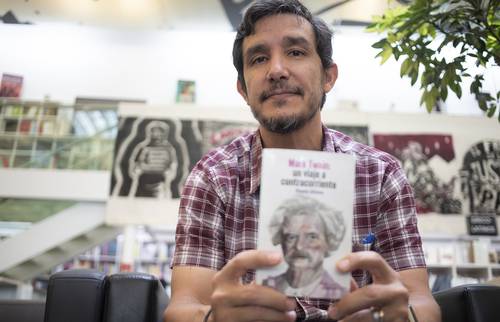The superficial reading of the American writer Mark Twain has provoked initiatives to censor his work for being racist, “when in reality every time the narrator uses the ‘n-word’ (nigger) is to emphasize those customs of the time that were indeed racist,” said Vicente Alfonso, author of the essay Mark Twain: A Journey Against the Current.
The Mexican narrator also referred to The Day There are many misunderstandings surrounding Twain (Missouri, 1835-Connecticut, 1910) Because for many years he was promoted as an easy author for children and young people, but if you look at it in depth, he is an author who questions a lot, so there is a discussion about whether he should be read or not.
.
Vicente Alfonso (Torreón, 1977) commented that many shortened versions of the novel have appeared The Adventures of Huckleberry Finnand agreed with the position of Toni Morrison, Nobel Prize winner for Literature in 1993, that reading accompanied by the American allows one to see things that had not been seen before.
The essayist and editor, Alfonso continued, assumed that nothing is gained by censoring authors, but that it is necessary to make readings supported by experts, because “if you want to promote critical thinking, you have to teach those readers – not necessarily children – to read between the lines, because the writer can say tremendous things on the surface and is actually demanding a deep approach.”
The author, who gave a series of lectures on Twain at the Casa Estudio Cien Años de Soledad, compiled as an essay in a volume co-edited by Grano de Sal and the Foundation for Mexican Letters, highlighted his excitement that Many years have passed and he is still a very controversial author, who provokes discussions and we know that this is the purpose of literature: to provoke discussions and make us think.
.
The novelist maintained that Twain realized that the intention civilizational
of his country He ignores other cultures. This makes him feel very uncomfortable and he begins to defend, through his literature, a plurality, the need for respect for others. A very advanced vision.
.
He said that in the chronicles Travel around the world, following the equatorTwain recorded that in India she saw girls leaving school wearing uniforms like those worn in the United States or the United Kingdom, even though the climate and needs were different.
The American author He devotes a very large part of his chronicles to India. From then on, he not only assumes himself as an author who carries messages, but one who draws on all the cultures he passes through. A first-rate chronicler emerges who advocates for diversity, at least a century before these discourses became more in vogue. The late Twain was convinced of the need for a plurality of cultures and it can be seen in his books. There are still discussions going on beneath the surface that make him a very lively author.
.
For Vicente Alfonso, there is a parallel between the works of Gabriel García Márquez and Twain, “which perhaps has to do with the training of both as journalists, authors accustomed to drawing on what surrounds them, from day-to-day research and not so much making up stories as reporting on them. The former said that he reported on novels, I am convinced of that and I believe that Twain did too.
“They even share certain passages: in times of epidemic, the dead floating in the river; of course, the boats of the Magdalena in Love in the time of choleraby García Márquez, are much smaller, but they have the same importance as in Twain’s work.
“The Mississippi has a great presence in Twain’s life, not only because he lived on its banks from a young age, watching the ships that he defined and remembered as floating palaces go by and dreamed of being a pilot on them, a project he achieved after two years of training, but also because of what it represented geographically for the United States.
“When he became a ship pilot, he thought that would be his life, but he only worked in the profession for two years because the civil war broke out and the flow of ships on the Mississippi was interrupted, which weighed heavily on him because he had to find another way of life, dedicate himself to other jobs.
So he assumes that when he suffered from a creative block it was due to a lack of movement. He would rent boats in Europe to navigate the rivers in order to overcome this block, and every time he felt that a project was stalling, he would embark. Sometimes we don’t see the solution from a perspective, but we move a few steps and there is a journey.
Vicente Alfonso concluded that he sees in Twain one of the fathers of autofiction because the first character he cultivates is himself. We still do not know completely which episodes of his life and his memories really happened and which ones he nurtured as part of the legend and his figure. He is obsessed with identity as something that is not fixed, but in constant movement.
.
